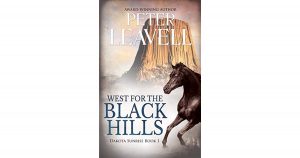by Peter Leavell, @PeterLeavell
I’m a dad. Sure, my kids hit their twenties, but I’m still a father. So, I have three stories I continually use to torture them if we’re in the car.
Me: “Look, there’s a dairy where farmers milk chickens.”
Also, me: “The murderer’s name is Falling Rock. He only kills his victims near cliffs along the road, so signs are posted to watch for Falling Rock where he’s taken a life.”
And most adamantly: “The opposite gender has cooties.”
Them: “Dad, seriously. None of those things make sense. Except maybe the cooties.”
Here’s the problem. In my mind, my stories do make sense. And I know why. I have difficulties with literary categorization and boundaries.
So when I enter a bookstore, I can’t quite understand the signs on the bookshelves. I pull a book from the history section and start to read. “I am confused. This should be in the fiction section.” Biography is the same way.
I read Shakespeare’s plays for philosophy. I study the Bible’s first-hand stories of Jesus, Who is telling parables, for concrete doctrine. I wander in the kid’s section and read for self-help. I study old romances by Brontë and Austin for spiritual enlightenment.

When I wander into the Christian fiction section, the book labels don’t make sense to me, either. Some of the books offer escape, and others bring theological masterpieces. While still others are quite romantically spicy and offer a bit of steam.
I found a few writers and educators who have the same problem as I do. Literature teachers ignore what categories publishers slap on the book spine and look for the deeper meaning in the text. So when I discovered such writers as Harold Bloom, C.S. Lewis, and Mortimer Adler who focus on a book’s aesthetic, I embraced their thinking.
A book is either bad or good. The text is either well written or it is not. The meanings are either easy to grasp or are hidden.
You’re a writer. You have a story in your head. You try and wedge it into a category that booksellers have created to make purchasing decisions easier. Cool. Okay. But your first mission should be of a literary quality, not a capitalistic, economic focus. At the end of the day, the reader wants a good book.
Your focus is to write good plots in clear, precise language. The meanings are woven naturally throughout, which will create a bond between the characters and the readers. If your book takes place in the past, they’ll slap a historical fiction label on the cover. If there’s more romantic drama than action they’ll also decide to add a label. And if the characters’ journey is about spiritual matters, you’ll probably find yourself safely nestled in the Christian Fiction section.
Be a good writer who is less focused on labels and more on what is good, true, and beautiful. I can’t wait to teach my students about your work.
Philip Anderson keeps his past close to the vest. Haunted by the murder of his parents as they traveled West in their covered wagon, his many unanswered questions about that night still torment him.
His only desire is to live quietly on his homestead and raise horses. He meets Anna, a beautiful young woman with secrets of her own. Falling in love was not part of his plan. Can Philip tell her how he feels before it’s too late?
With Anna a pawn in the corrupt schemes brewing in the nearby Dakota town, Philip is forced to become a reluctant gunslinger. Will Philip’s uncannily trained horses and unsurpassed sharpshooting skills help him free Anna and find out what really happened to his family in the wilderness?

Peter Leavell, a 2007/2020 graduate of Boise State University with a degree in history and a MA in English Literature, was the 2011 winner of Christian Writers Guild’s Operation First Novel contest, and 2013 Christian Retailing’s Best award for First-Time Author, along with multiple other awards. An author, blogger, teacher, ghostwriter, jogger, biker, husband and father, Peter and his family live in Boise, Idaho. Learn more about Peter’s books, research, and family adventures at www.peterleavell.com


